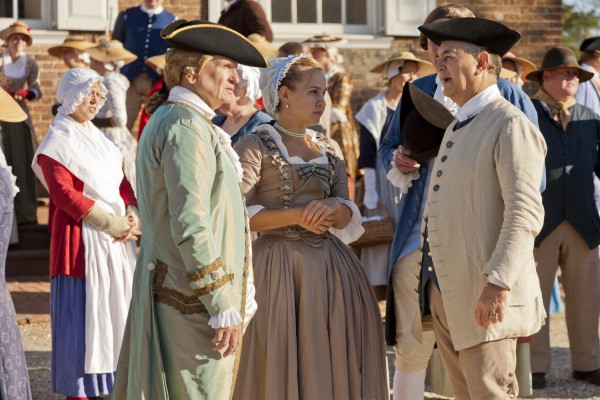 So you’ve got your tickets and you’re ready to head out into town. You’ve picked up the official Colonial Williamsburg Guide. You’ve rented a colonial dress for your daughter. Your son is sporting a cocked hat and a musket. Now what? Maybe it’s time to take your experience to the next level. It’s time to talk Colonial!
So you’ve got your tickets and you’re ready to head out into town. You’ve picked up the official Colonial Williamsburg Guide. You’ve rented a colonial dress for your daughter. Your son is sporting a cocked hat and a musket. Now what? Maybe it’s time to take your experience to the next level. It’s time to talk Colonial!
So how do you do that? We asked Cathy Hellier, Colonial Williamsburg historian and author of Eighteenth-Century English as a Second Language (available online or in the bookstore!). With her help we came up with some easy steps for sounding like an 18th-century resident of Duke of Gloucester Street.
#1 Hello and Goodbye
“Good day” or “How do you do?” work just fine as greetings. So does “Good afternoon” or “Good evening.”
But if you want to really get into the spirit of things, try out “Your servant” instead of Howdy. You can even embellish it a little more by saying, “Your humble servant” or “Your most obedient servant.”
The polite response to “your servant,” assuming you are social equals, is to respond in kind. One way to do this, and to add a little more, is to say, “And I am yours. How does your family?”
In parting, use “Your servant” or “I wish you a good day, Madam/Sir.”
#2 Avoid “Hey Dude!”
Use 18th-century forms of address. It might sound a bit formal, but you should call an unfamiliar person Sir or Madam. A child is Young Sir or Miss.
And if you are using a person’s name, it is “Mrs. Braxton” or “Mr. Wythe,” not Elizabeth or George.
#3 ‘Tis, ‘Twas & ‘Twill
Have a little fun with 18th-century contractions, like so:
‘Tis a fine, warm day.
‘Twas a splendid lecture.
‘Twill be an even better day tomorrow.
Easy enough. And it will sound great because you’ll be saying it with a lovely English accent. Pure Shakespeare! Right?
Wrong.
“These Americans would sound pretty American,” says Hellier. (What?!?)
“Around the time of the Revolution, the British elite were consciously changing the way they pronounced vowels to sound more like they speak today. The Americans, on the whole, didn’t make that shift. And, of course, there were regional differences in both Britain and America.”
So, for example, when the British—at least in higher society—said the word “ask,” it began to sound more like “ahsk.”
Still, we don’t really know precisely how any given person sounded. Williamsburg was actually a pretty cosmopolitan place in the 18th century. There were people whose families had been around for generations. Others just stepped off the boat.
“We don’t do a lot with accents because we can’t. It’s a place where you’d find all kinds of accents, all kinds of ways of pronouncing vowels. It wasn’t all posh-sounding or all American-sounding. It was a salad of sound on the street.”
Time to get back to the lesson.
#4 How to Ask Questions
The word “pray” was often used to introduce a question. For example, you might ask, “Pray, Madam, do you know the direction of the Raleigh Tavern?”
But don’t use the word “do” in questions with the verb “have.” So instead of asking, “Do you have a map?” ask “Have you a map?”
#5 Some Colonial Vocab
Here are a dozen “translations” of common expressions you can use right away:
| 2015 yes/nohotel room snack upstairs restroom very nice time Ugh! Nonsense! Wow it’s hot! No problem For sure Let’s go over there Gotta go |
1776 aye/naylodgings refreshment above stairs necessary house exceeding agreeable evening Fie! ‘Tis a prodigious warm day It is of trifling importance Indeed! Let us proceed I must take my leave |
By now you’re probably wondering how Hellier figured out so much about how people spoke in the 18th century. The answer is in the careful reading of a variety of written sources. But some are better than others.
“You have to find sources that get close to conversation,” says Hellier. Business letters or the journals of the House of Burgesses are not as useful as personal letters, for example.
Private letters to friends are valuable because they have a more conversational tone. Diaries, too. “Novels from this period are useful because they’re trying to be more like everyday life,” says Hellier. Even though they can be highly mannered, there is much to be learned in the way people of different social classes are made to speak.
Grammar books indirectly offer evidence for what people say and do in everyday situations. They not only offer the rule, they also give examples of how people typically break the rules. That is good evidence for establishing what people were really saying.
Finally, foreign language instructional books contain lists of phrases with translations. “It’s like a Berlitz phrasebook,” says Hellier. “They tell you what to say to the tailor, or at the shoe shop.”
Historians are fond of saying the past is a foreign country. So here’s the proof.
And just like any foreign language, there’s no better way to become an expert than by trying it out with native speakers, here in Williamsburg.



John says
This perpetuates the idea that the modern English accent comes from the elites changing pronouciation and that the American accent is closer to older English speech. Flat wrong, as evidenced by the fact that the elites in Britain still have their own specific manner of speaking, and it does not reflect English accents in most of the country spoken by the ordinary people. In fact many accents in modern England have not yet been subject to the “Great vowel shift” of half a thousand years ago either and remain mostly intact with Middle English ways of speaking.
The British elite’s received pronounciation is actually closer to American than most other English accents, funnily enough, With for example ‘cat’ being pronounced much closer to the American way than to the English way.
Not to say that Americans in the 1700s didn’t have their own distinct accents seperate from areas of England, but this myth of “the modern English accent was invented after the birth of America!” is very disappointing to see pushed by anyone at this point. It is a myth that could well damage educational standards at any reenactment event depicting the early years of the USA.
Otherwise - an informative article.
Cathy Hellier says
I think you may have taken some points in a different way than was intended. In the first place, this post was about the 18th century, not “the modern British accent.” I agree that there were, and are, many regional accents in Britain and didn’t state or imply that contemporary elite British speech reflects “English accents in most of the country spoken by ordinary people.” Elite British speakers were consciously changing their speech to sound more like they do today, but that is not to say that they sounded exactly like the elite British do today. Like all language, elite British speech has continued to evolve.
Also, there is no claim that the modern English accent was invented after the birth of America. What is clear is that by 1775, British writers were beginning to produce pronouncing dictionaries and other language guides for the British middling classes, so that they could begin to mimic the elites’ changes in pronunciation. The audience for these publications did not want to be heard as vulgar (lower-class) or provincial. In other words, there were clear, status-laden changes in vowel pronunciation in Britain in the third quarter of the eighteenth century, and many of the “middling sort” wanted in on it. Others, however, couldn’t have cared less and continued to speak as they always had.
No, American and British English did not suddenly diverge at the American Revolution, nor did Americans preserve some “pure” form of earlier British English. In fact, American English began to diverge from British English from the time the colonies were founded—that’s just the nature of language. It’s also important to remember that several American colonies had been settled generations before the Revolution, so they had begun to develop their own regionalisms. How pervasive among the population those regionalisms might have been depended on several local factors, such as, how many old-settler families remained, how many immigrants the area continued to receive, and what the inhabitants valued about speech (fashion, old-settler identity, etc.).
Americans had mixed reactions to British English after independence. Some imitated British elites, while others went so far as to advocate for a completely different language for America (a position that obviously didn’t gain much traction). Some advocated for a distinctly American form of English. And again, many couldn’t have cared less.
What I hope the above blog emphasized is the diverse nature of British and American English and a turning point in elite British elite speech that ultimately most Americans did not embrace.
Trip Wiggins says
Cathy - Any idea if the book is going to be REPRINTED? Just called the Revolutions Bookstore and they said the title was out of stock. As an 18th century living historian in northern Virginia, this book sounds like just the thing I’m looking for to improve my impression and others in my group.
Mr. Wiggins,
It is out of stock at the moment, and no decision has made yet about whether to reprint it.
Bill
Fran says
I found it here: http://www.williamsburgmarketplace.com/webapp/wcs/stores/servlet/ProductView?storeId=10001&jspStoreDir=wmarket&categoryId=37822&catalogId=12122&langId=-1
Amy says
The book is also available at our Historic Post Office in the historic area.
Areana says
YASSS! This website is exactly what i have been looking for!
Erica,
The easiest way is to pick up a copy at Williamsburg Booksellers, our bookstore at the Visitor Center. But if you are too far away to drop by, give them a call at 757-565-8450 and they can make arrangements to send it to you.
Just out of curiosity where can you get a copy of this book? I didn’t see it on the website for the CW bookstore or on Amazon. I’d be interested in reading it.
Thanks!
John says
I have been unsuccessful in finding an internet site from which I can purchase this book. Hoping I can be informed. Tried the Williamsburg site without success. Cheers